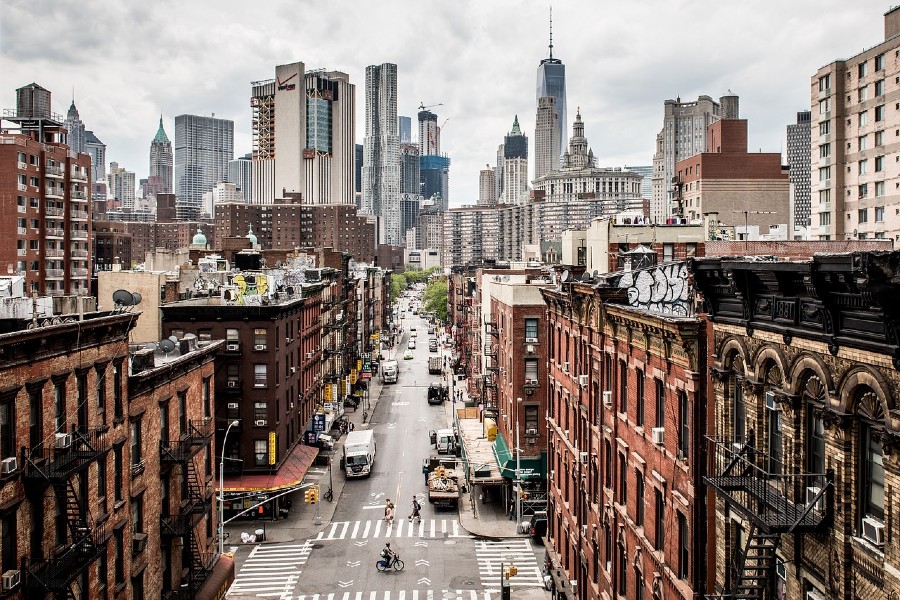 WE- ACT writes that while New York State Governor Kathy Hochul and our legislators have frequently expressed support for environmental and climate justice.
WE- ACT writes that while New York State Governor Kathy Hochul and our legislators have frequently expressed support for environmental and climate justice.
WE ACT for Environmental Justice is disappointed that they did not include meaningful funding for environmental justice in the FY 2022-23 New York State Budget – which was completed late on Friday, April 8, 2022 – for legislation and programs designed to address the disproportionate impacts of pollution, climate change, and other environmental hazards on the state’s disadvantaged communities.
In response, we urge our legislature to take meaningful action bypassing some of the most urgent climate and environmental bills – listed below – this session for Earth Day.
Sonal Jessel, Director of Policy at WE ACT for Environmental Justice, issued the following statement:
“New York State had taken a leadership role in equitably addressing climate change, passing the Climate Leadership & Community Protection Act (CLCPA) back in 2019. Yet the state has failed to adequately fund the initiatives needed to reach those climate goals, with its 2022-23 budget falling far short of the $15 billion necessary to achieve this mandate. And it’s the most vulnerable communities who are going to continue to pay the price for the State’s inaction on climate and environmental hazard reduction even though they produce the least greenhouse gas emissions that are causing this crisis. Recent EPA research found that Black/African American people are exposed to higher levels of air pollution due to their cumulative exposure to emissions from multiple sources. Inadequate action on climate and environment is killing communities of color.”
Yes, we welcome the $4.2 billion Clean Water, Clean Air, and Green Jobs Environmental Bond Act and the $400 million Environmental Protection Fund (EPF), but this cannot be conflated with sufficient environmental justice funding.
These two sources include important funding for climate mitigation, revitalizing waterfronts, and cleaning the air in environmental justice communities. However, the Bond Act and the EPF are only part of the solution.
We need billions more. We need funding to achieve the Governor’s promise of two million climate-friendly, electrified, or electrification-ready homes by 2030, and 800,000 of them in low to moderate-income housing.
And we need the building code changes to help achieve that goal, save taxpayers money, and align with the CLCPA.
We need funding to rapidly deploy renewable energy, and we need at least twice the amount of funding given to relieve utility debt for struggling New Yorkers.
On the transportation front, we applaud the funding to transition New York State to all-electric school buses by 2035, building on the legislation we helped pass here in New York City.
And we also applaud the funding for the Second Avenue Subway extension into East Harlem, but we will continue to fight to ensure that this infrastructure investment includes our community-driven recommendations to address environmental and economic challenges in the neighborhood.
Our representatives failed to show their commitment to environmental justice.
For example, they failed to address New York’s most shameful environmental justice issue: childhood lead poisoning.
We need a billion dollars to make even a dent in childhood lead poisoning rates. New York State has the highest rate of childhood lead poisoning in the United States.
This issue affects Black/African American, Latino, and Asian children the most. In New York City, more than 80 percent of the lead poisoning cases are children of color.
These children tend to live in older housing with peeling paint and are ingesting this poison every day, leading to developmental delays and a lifetime of lower IQ.
It is estimated that 5.3 million homes in New York State are covered in lead paint.
The Lead-Free Kids NY coalition outlined a pathway to get the State on track to eliminate the poison, yet our State government chose to ignore the need.
Childhood lead poisoning is one of the greatest environmental injustices in our State, and our Governor gave us pennies to address the problem.
To address the issue now, we urge the legislature to pass the following bills this session:
The Lead Testing Point of Sale – S.2142-A (Kavanagh)/A.6608-A (Rivera)
Closing the Insurance Loophole – S.3079-A (Ryan)/A.7488-A (Rivera)
The Renovation, Repair, and Painting (RRP) Acts – S.6554 (Bailey)/A.7117(Bronson)
Yes, there are good things in this budget, but it is maintaining a status quo. It’s not nearly enough to address the environmental and climate justice issues New Yorkers are struggling with today.
And while we have been diplomatic in the past, trying to accentuate the positive, we have come to expect better from our state leaders.
For those of us concerned about the environmental health of New York’s disadvantaged communities, we’re extremely disappointed to see Albany short-changing them yet again.”
We are watching closely to see whether our leaders can show us that their promises of environmental justice are not just empty statements.
We are looking to our legislative body to pass meaningful environmental justice and climate justice legislation for Earth Day. We urge the Majority Leader and the Speaker to pass the following in an Earth Day Agenda:
Cumulative Impacts & Extended Public Participation Bill Package
S.1031-C (Stewart-Cousins)/A.2103-C (Pretlow) & S.3211-B (Ramos)/A.6530-B (Barnwell)
Prevents the disparate siting of toxic facilities in disadvantaged communities and ensures adequate public participation in the process. Deemed as a “holy grail” of environmental justice legislation.
Energy Efficiency, Equity, and Jobs Act
S.3126-B (Parker)/A.3996-B (Hunter)
Ensures cost-saving and pollution-reducing energy efficiency measures are deployed equitably across the State.
The Safe Cosmetics and Personal Care Act & The Mercury Ban Bill
S.3331 (Rivera)/A.143 (Gottfried) & S.8291 (Brouk)/A.8630 (Reyes)
Bans the most toxic chemicals from cosmetics and personal care products, and requires ingredients disclosures for other chemicals so buyers can make informed choices. These are products marketed to and used by women of color the most.
The All-Electric Building Act
S.6843-B (Kavanagh)/A.8431-A (Gallagher)
Sets a limit on emissions for buildings under seven stories starting in 2024, and bigger buildings starting in 2027, while ensuring the State reports on how they will keep utility bills affordable.
The Gas Transition and Affordable Energy Act & The Building Codes and Standards Act
S.8198 (Krueger)/A.9329 (Fahy) & S.7176 (Parker)/A.8143 (Fahy)
Amends building codes to help the State transition off gas, get more efficient appliances, and reduce the cost of gas on ratepayers while ensuring low-income people have affordable heating and cooling so they aren’t the only people left with polluting gas.
It is time people of color and low-income stop getting ignored in the fight for their right to live in healthy communities. They would like to see funding from the Bond Act and the EPF go to directly improving disadvantaged communities by rapidly focusing on projects such as greening the South Bronx waterfront and making it a publicly accessible space for South Bronx residents, to help reduce the extreme heat from climate change and improve air quality in a community suffering from some of the worst air pollutions in the state.
Additionally, we expect to see funding to offshore wind and a geothermal tax credit get us closer to turning off dirty peaker plants in the next 5 years, and would like to see a timetable for that transition.
Lastly, we expect to see funding for the MTA and for school buses go towards putting electric buses in disadvantaged communities first, as they have been subjected to the worst air pollution for far too long. Simply. we are asking our State representatives to show us they are committed to environmental justice.”
Become a Harlem Insider!
By submitting this form, you are consenting to receive marketing emails from: Harlem World Magazine, 2521 1/2 west 42nd street, Los Angeles, CA, 90008, https://www.harlemworldmagazine.com. You can revoke your consent to receive emails at any time by using the SafeUnsubscribe® link, found at the bottom of every email. Emails are serviced by Constant Contact








